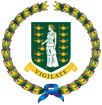Statement

Statement By Minister For Education And Culture Honourable Myron Walwyn
At The Third Sitting Of The Fourth Session Of
The Second House Of Assembly Of The Virgin Islands
Thursday, February 12, 2015
 Madame Speaker I thank you for the opportunity to make a brief statement to this Honourable House on the restructuring of the Ministry and Department of Education.
Madame Speaker I thank you for the opportunity to make a brief statement to this Honourable House on the restructuring of the Ministry and Department of Education.
Madame Speaker, The Ministry of Education and Culture was created in 1993 when the former Ministry of Health, Education and Welfare was divided into two ministries:
- Ministry of Health and Social Development;
- Ministry of Education and Culture
The Ministry of Education and Culture comprises the Central Ministry Administration Unit and the following Departments:
- Department of Education, which is the largest
- Department of Culture
- Department of Youth Affairs and Sports
- Her Majesty’s Prison
- Library Services Department,
with additional responsibility for other subjects, committees and Statutory Boards.
Madame Speaker, it was decided in 2004 to restructure the Ministry in order to deliver services to the public more efficiently and effectively and to integrate the Department of Education and the Central Administration of the Ministry. The Department of Education has a longer history than the ministry being established more than a decade before the ministerial system came into effect in 1967. It is the largest Department under the Ministry of Education and Culture and is charged with responsibilities of providing effective learning experiences for the Territory’s children and young people as well as life-long learning experiences for the entire population. For one reason or another over the years Madame Speaker, with the split in the Ministries, the restructuring was not realised.
Over time the Territory has made significant strides with regard to international driven imperatives such as the UNESCO Education For All goals and the Millennium Development Goals as well as the programmes outlined in the manifesto of various administrations. These have realized some progress. However, there remains some challenges Madame Speaker, and as the world changes the system must have the capacity to not only complete the unfinished agenda but must be agile enough to respond to emerging issues and concerns. Change is needed to address some imbedded deficiencies and to meet the requirements of the 21st century. The Ministry of Education has therefore developed a programme of reforms.
In order to efficiently and effectively achieve the goals of the education sector not only must the ministry be reorganized, the roles and functions must be realigned and more appropriately resourced to ensure success. There is a need to strengthen the governance and legislative frame work, strengthen available technical capabilities through recruitment and continuous professional development especially in the areas of planning, Information management, setting of standards, regular reviews and audits and regular reporting on the performance of the sector and institutions under the ministry. Programme planning, goal and target setting must become the norm.
In addition the accountability systems and the information systems need to be strengthened to ensure that the culture of making decisions based on anecdotes and feelings are changed to one which enables decision making based on assessment and the use of data and information collected on the performance of the sectors under the Ministry.
The restructuring will ensure that the work of the ministry in the administration of education is compatible with the requirements of the Education (Amendment) Act of 2014 and the reform initiatives being undertaken in the sector. This Act gives the Ministry of Education greater powers in the administration of education than the previous Education Act of 1977.
Madame Speaker the main objectives of restructuring are:
- Establish a Ministry with more technical staff needed to carry out the functions of the Ministry.
- To define clearly the code of procedure and behaviors of all employees in the Ministry of Education and Culture by requiring:
- Clearly defined job descriptions and roles;
- Clearly established lines of reporting; and
- Clear Protocols
- Integrate areas of duplications, for example
- Printing
- Resources
- Finance
- Human Resources Management
- To establish and integrate a Curriculum Unit within the Ministry.
- To establish the School Management Committees as indicated in the Education (Amendment) 2014 Act to improve the work of the Ministry.
- To establish a planning unit.
- To develop clearly defined policies approved by the Minister and monitor their implementation.
- Develop an effective system for property maintenance.
Madame Speaker the work on the restructuring of these two entities have been ongoing for some time and I am happy to say that we are finally at the point of implementation. If one looks critically at what exists, it would be fair to say that the old arrangements do not make for economies of scale and efficiency and has often led to confusion for the public, both local and abroad, regarding who was responsible for what aspects of the portfolio. The Ministry of Education has been working on this process and a paper was presented to Cabinet. The Restructuring is being done to ensure that it is compatible with the requirements of the Education (Amendment) Act 2014 and other reform initiatives within the Public Service. A proposal was presented and has been accepted to begin the merging of the Ministry and Department on a phased basis effective January 2015.
Madame Speaker, I want to take this opportunity to thank all the various persons and teams who have worked on different permutations of the restructuring at various times during the process. A lot of hard work was put in and we are happy to see the progress made to date.
Thank you Madame Speaker.

